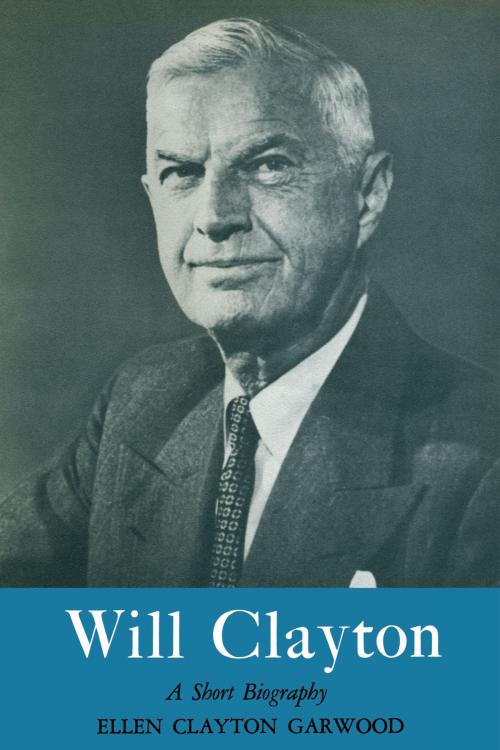| Author: | Ellen Clayton Garwood | ISBN: | 9780292772885 |
| Publisher: | University of Texas Press | Publication: | July 3, 2014 |
| Imprint: | University of Texas Press | Language: | English |
| Author: | Ellen Clayton Garwood |
| ISBN: | 9780292772885 |
| Publisher: | University of Texas Press |
| Publication: | July 3, 2014 |
| Imprint: | University of Texas Press |
| Language: | English |
Will Clayton left his mark on world commerce through the development of Anderson, Clayton & Co., the world's largest cotton marketing firm; he made an equally important impress on international economics and politics through special and vital service in the State Department during three crucial years of world history. The politico-economic philosophy that Will Clayton developed as cotton merchant to the world provided the basis for his distinguished service as Assistant Secretary of State and as Undersecretary of State for Economic Affairs and influenced the course of international events far more than is generally realized. "When the full story of the genesis of the Marshall Plan is told, it will become evident that the inspiration was Will Clayton's; which means he will have a firm niche in history, for this, if for nothing else," wrote John Dalgleish in Everybody's Weekly (London) in 1947. Dalgleish's opinion is supported by documentary evidence and the statements of others whose views are given in this short biography. The principal events in Will Clayton's background that shaped his character and developed his personal philosophy are here portrayed by one who had a unique opportunity to view her subject at close range during the main periods of his careers in government and business. In this brief bio- graphy, his eldest daughter, Ellen Clayton Garwood, intimately but objectively traces the evolution of Clayton's realistic internationalism. The effectiveness of his governmental service in a fast-shrinking world had its roots in his early struggles in international cotton marketing. His marked ability to gain the support of Congress for government proposals—extension of the Reciprocal Trade Agreements Act, the British Loan, the Marshall Plan—is foreshadowed in his triumphant defense of his own business before a Senate investigating committee in the early twentieth century, and by his championship of Southern delivery on futures contracts on the New York Cotton Exchange. But the story is not all one of success. Will Clayton wanted more than anything to see his country assume membership in an International Trade Organization, for the charter of which he had worked so hard. His disappointment here—partially offset by the success of the General Agreement on Tariffs and Trade—finds counterpart throughout these pages in the obstacles he had to overcome in his development as a human being. And human being he emerges—son, husband, and father; businessman and statesman—whose measure, with its shadow and its highlights, should serve as strong encouragement for those who would serve their country and their world with equally intelligent devotion. This book, therefore, brings a note of definite optimism. Will Clayton started out as a poor boy among the bewildered people of the reconstructed South. He emerged a statesman who drew out of still worse confusion in the world a program of hopeful and uplifting clarity. His own words, in a cable from Geneva, August 15, 1947, describe the challenge he met—a challenge that recurs in different form today: "A great opportunity to help Europe lift herself permanently out of a morass of bilateralism and restrictionism has floated in to us on a floodtide of destruction. If we fail to seize this opportunity now it will probably never return except possibly after a third World War."
Will Clayton left his mark on world commerce through the development of Anderson, Clayton & Co., the world's largest cotton marketing firm; he made an equally important impress on international economics and politics through special and vital service in the State Department during three crucial years of world history. The politico-economic philosophy that Will Clayton developed as cotton merchant to the world provided the basis for his distinguished service as Assistant Secretary of State and as Undersecretary of State for Economic Affairs and influenced the course of international events far more than is generally realized. "When the full story of the genesis of the Marshall Plan is told, it will become evident that the inspiration was Will Clayton's; which means he will have a firm niche in history, for this, if for nothing else," wrote John Dalgleish in Everybody's Weekly (London) in 1947. Dalgleish's opinion is supported by documentary evidence and the statements of others whose views are given in this short biography. The principal events in Will Clayton's background that shaped his character and developed his personal philosophy are here portrayed by one who had a unique opportunity to view her subject at close range during the main periods of his careers in government and business. In this brief bio- graphy, his eldest daughter, Ellen Clayton Garwood, intimately but objectively traces the evolution of Clayton's realistic internationalism. The effectiveness of his governmental service in a fast-shrinking world had its roots in his early struggles in international cotton marketing. His marked ability to gain the support of Congress for government proposals—extension of the Reciprocal Trade Agreements Act, the British Loan, the Marshall Plan—is foreshadowed in his triumphant defense of his own business before a Senate investigating committee in the early twentieth century, and by his championship of Southern delivery on futures contracts on the New York Cotton Exchange. But the story is not all one of success. Will Clayton wanted more than anything to see his country assume membership in an International Trade Organization, for the charter of which he had worked so hard. His disappointment here—partially offset by the success of the General Agreement on Tariffs and Trade—finds counterpart throughout these pages in the obstacles he had to overcome in his development as a human being. And human being he emerges—son, husband, and father; businessman and statesman—whose measure, with its shadow and its highlights, should serve as strong encouragement for those who would serve their country and their world with equally intelligent devotion. This book, therefore, brings a note of definite optimism. Will Clayton started out as a poor boy among the bewildered people of the reconstructed South. He emerged a statesman who drew out of still worse confusion in the world a program of hopeful and uplifting clarity. His own words, in a cable from Geneva, August 15, 1947, describe the challenge he met—a challenge that recurs in different form today: "A great opportunity to help Europe lift herself permanently out of a morass of bilateralism and restrictionism has floated in to us on a floodtide of destruction. If we fail to seize this opportunity now it will probably never return except possibly after a third World War."















